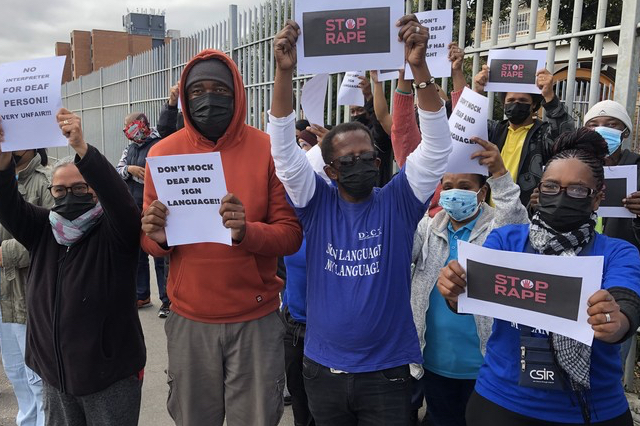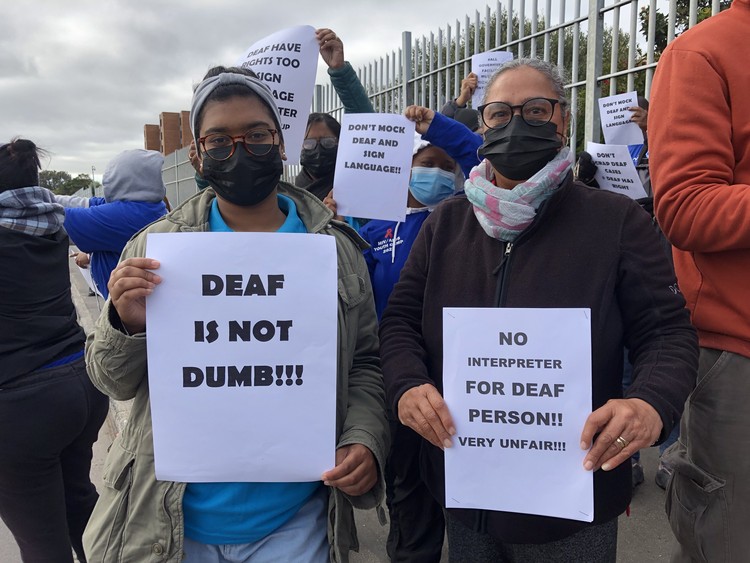Dozens of people from the deaf community protesting outside the Bishop Lavis Magistrates’ Court earlier this month to support a deaf woman who was gang raped. The woman has been struggling since the rape in December for the court to secure a sign language interpreter. Photos: Mary-Anne Gontsana
By Mary-Anne Gontsana
GroundUp
- The case of a 45-year-old deaf woman who was raped in December 2022 will finally be heard in court next month.
- The matter has been postponed several times due to the absence of a sign language interpreter in court.
- This comes in the midst of Deaf Awareness month in September.
- Civil rights organisation, Action Society, has been helping the woman and her family since August to secure a sign language interpreter for the court hearings.
- According to DeafSA, the problem is not a shortage of sign language interpreters, but that courts must submit a request at least two weeks ahead of each hearing date.
As the world marks Deaf Awareness month in September, civil rights organisation Action Society has highlighted the lack of availability of sign language interpreters in courts.
Action Society has been following a case currently before the Bishop Lavis Magistrates’ Court in which a deaf woman from Bonteheuwel had been raped by four men in Cape Town in December last year.
The 45-year-old woman, who is only identified as Lily (not her real name), has been struggling since December to have her matter proceed in court.
The case against four suspects accused of raping Lilly is to be transferred to the Parow Regional Court on 12 October.
The case was first heard at the Bishop Lavis court in September this year, but has been postponed several times due to the absence of an accredited interpreter. Lily’s family have been trying since December to arrange for an adequately skilled sign language interpreter.
Following protests by Action Society and supporters from the hearing-impaired community outside the court hearings, a relevant interpreter has since been secured for the next court hearing in October.
Action Society’s Kaylynn Palm said, “The family contacted us to assist with the matter, since they had been experiencing challenges, especially when it came to a sign language interpreter. Action Society has fought tooth and nail with the family since August this year to get to this point.”
Palm said that with the help of organisations and the National Prosecuting Authority (NPA), an interpreter was brought on board. “Action Society is glad that a sign language interpreter has been made available, but the fact remains that it has taken much too long for the court to get to this point following multiple postponements,” said Palm.
A family spokesperson, Antoinette Meyer, explained that “initially we got messages to say she must be in Parow to meet with a sign language interpreter and the prosecutor. She and I went back twice and there was no interpreter. She went a third and fourth time with her mother and they didn’t even know she had an appointment with the prosecutor, and there was no interpreter”.
Meyer said, “Lily’s only fear is that these guys are going to get away with it. It has been so frustrating for us to come to the courts over and over again only for there to be no interpreter.”
According to the Deaf Federation of South Africa (DeafSA), the problem is not that there is a shortage of sign language interpreters, but that courts are required to submit a request at least two weeks ahead of the hearing date.
“Courts need to contact DeafSA two weeks in advance. The courts have a good relationship with DeafSA Western Cape. When they contact us in advance, we then book interpreters,” said Francois Deysel, the national coordinator at DeafSA.
He said skilled sign interpreters are very busy as they provide services during the week at government and corporate events or workshops. Booking an interpreter in advance also helps DeafSA look into the specific needs of the client, the seriousness and sensitivity of the case, said Deysel.
“Serious cases involving deaf people have been thrown out of court many times because proper procedures had not been followed. From the opening of a docket, there should be an interpreter on record,” said Deysel.
Deysel said DeafSA had an arrangement with the police, which entailed DeafSA providing interpreters when needed. “When I started 22 years ago, there were only ten sign language interpreters in the whole country, and now we currently have 180. We are constantly training interpreters, especially since sign language is now one of the official SA languages,” said Deysel.
Tracey-Lee Priestly (L), from DeafSA and Jennifer Lepono from the Deaf Community of Cape Town were among the supporters picketing outside court in September.
Ronel Davids who works in different communities through the Deaf Community of Cape Town (DCCT) is fluent in sign language and is a qualified social worker.
“My understanding is that at the police station Lily did not have a sign language interpreter but had a friend that was relaying the information. So, what is written on the statement and how she signs it, might be two different things. So, the information might not stand up in court,” said Davids.
She warned that not everyone who knows sign language can work as accredited interpreters.
“I was speaking to a court official who works with cases involving children. I asked if the child is deaf? the court official said ‘Oh, we just Google for an interpreter.’ You cannot just take any interpreter and say it’s a sign language interpreter. The interpreter must be qualified in the field in which they are being requested,” she said.
Spokesperson in the Ministry of Justice and Correctional Services, Chrispin Phiri, said: “It is not common to have deaf interpreters in court since there isn’t a high volume of matters which require such a service. Where the service is required, a special arrangement can be made. It is not a question of shortage but rather an efficiency in obtaining the service.”
Follow African Insider on Facebook, Twitter and Instagram
Picture: GroundUp
For more African news, visit Africaninsider.com



